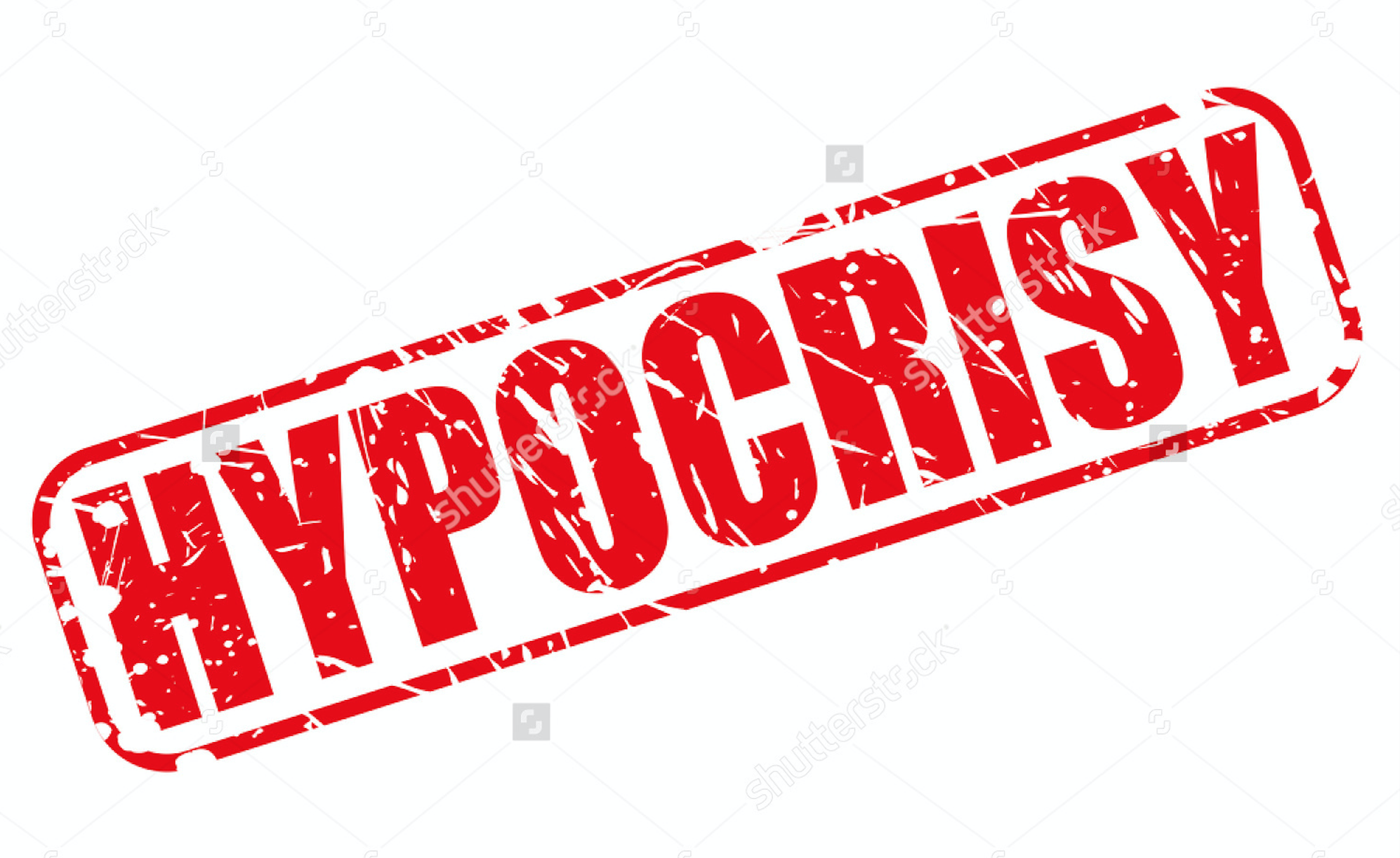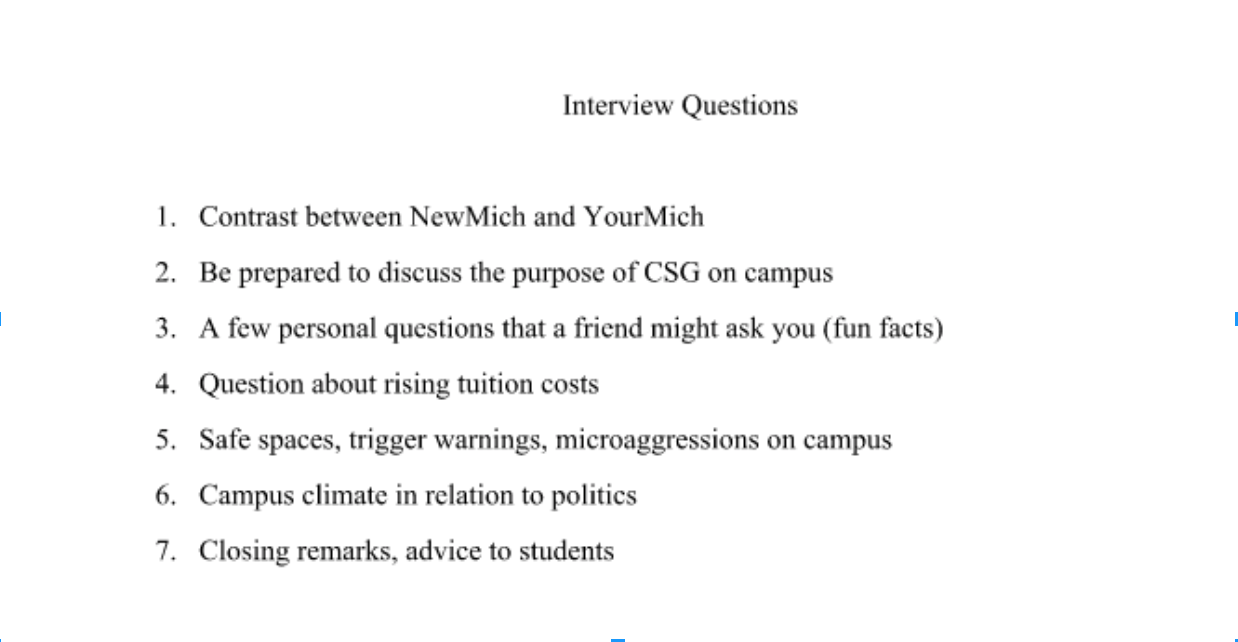Editor-in-Chief Deion Kathawa takes aim at the feckless institution of CSG: “[R]ather than make themselves accountable to you, the student body, in a simple interview, your elected representatives have made it abundantly clear that they find this duty to be merely optional—even though it was you who bestowed upon them their present positions and their corresponding powers. In short, they hold you in contempt.”

There comes a time in the life of every publication when it must truly decide both for what and for whom it stands. The former has always had a straightforward answer: The Michigan Review stands for free speech, fearless inquiry, accountability, and intellectual diversity. We have demonstrated our steadfast commitment to these ideals with each and every writer that has joined our staff, and with each and every piece that has graced our pages, since 1982. The answer to the latter, however, was admittedly a bit fuzzy. Until now.
Recent events have brought that once nascent inkling of an answer into sharp, blinding relief. For whom we stand is no longer in question: We, and I, as Editor-in-Chief, stand by, for, and with the Michigan community, the Wolverine family, and their interests, full stop. We will not pander to you, but always challenge you. We will not be afraid to speak hard truths to you, to stake an unpopular position if we believe it to have merit. We will always tell you the truth about what is happening on campus—as we are doing now, regarding Central Student Government (CSG).
We all understand intuitively that CSG is largely irrelevant in the grand scheme of things. But for their stated, erstwhile desire to be held accountable and make a difference on campus, this piece would never been written. The stark incongruity, the chasm, between what they say they believe and stand for and what they actually do has now become too great, too large, to ignore. To remain silent in the face of this hypocrisy would be for the Review to be derelict in one of its duties to you, the student body: to keep you well-informed about important campus goings-on.
They do not believe that ought to be accountable to us, and they have no desire to be made accountable. They do not care about you. The extent to which they put effort into their roles is the extent to which that effort will translate into a position with the Peace Corps after graduation.
In early-August, weeks ago and well before the start of the 2016-17 academic year, we reached out via email to CSG President David Schafer to inquire as to whether he and Vice President Micah Griggs would be willing to participate in a sit-down, on-camera, start-of-the-year interview. It would be wide-ranging, equal parts light-hearted and equal parts serious; it was scheduled for Sunday, September 25. We had questions planned which would get at the heart of this new administration: its goals, vision, and hopes for the year.
 Their answers to these questions would be ones that you, the student body of this university, would want to hear and would be valuable to us all.
Their answers to these questions would be ones that you, the student body of this university, would want to hear and would be valuable to us all.
We had been communicating with Mr. Schafer exclusively, up until September 23, that is, when we received an out of the blue email from the Communications Director for CSG, Joe Shea, who regretted to inform us that they would have to reschedule the interview for the following week: October 2. (This was not an issue, and we were happy to accommodate.) He then demanded, on behalf of CSG, that we, the Review, “send over a list of the specific questions you’ll be asking and who you’ll be asking them to.”
We replied, insisting on two things. First, that “[t]o provide the exact questions in advance would defeat the purpose of the interview, i.e., eliciting true, non-scripted … responses from the pair of them [Mr. Schafer and Ms. Griggs].” And second, that “[n]o interview subject is permitted to dictate what question(s) they wish to see or not during their interview.” Our hope, we wrote, was that “our elected representatives understand and are willing to abide by journalistic protocols and norms” regarding this interview.
CSG took sides when it ought to represent all students. Rather than be magnanimous and impartial, allowing freedom of speech, inquiry, thought, and association to run their course on these matters, CSG chose to take the low road, to be small, and to short circuit this robust and fundamentally civil process. CSG has made it clear that they do not represent all students here at Michigan.
In response, Mr. Shea wrote in relevant part: “Given the vague nature of the interview topics and your insistence on sticking to them, we’re going to cancel the interview.” (To be clear: Providing anything at all to the subject of an interview is not in the least required by prevailing journalistic norms and protocols. What we did choose to give to them was done out of courtesy and was more than generous.) We reached out again, the next day, September 26, to confirm that they were indeed going through with the cancellation of their appearance; we have not heard back since September 25.
Let that sink in for a moment. CSG demanded a specific list of questions in an effort to dictate precisely what questions we would ask and to whom we would ask them. And when it became clear that we are a journalism outfit with principles, some spunk, integrity, and a spine, they backed out.
In other words, rather than make themselves accountable to you, the student body, in a simple interview, your elected representatives have made it abundantly clear that they find this duty to be merely optional—even though it was you who bestowed upon them their present positions and their corresponding powers. In short, they hold you in contempt.
Furthermore, recent campus events have only served to bolster the sad conclusion that the members of CSG care not one whit for all of us, but only for themselves and a select subset of the campus population.
When the now infamous racist posters were discovered in Mason and Haven Halls, and in the run-up to a planned debate hosted by the non-partisan student group, the Michigan Political Union (MPU), on whether “Black Lives Matter is harmful to racial relations in the United States,” CSG put out a statement on September 26 criticizing (though not by name) this entirely legitimate exercise by MPU.
In taking sides in this factious, campus-wide discussion, CSG arrogated power to itself that it does not, cannot, and should not possess. CSG took sides when it ought to represent all students. Rather than be magnanimous and impartial, allowing freedom of speech, inquiry, thought, and association to run their course on these matters, CSG chose to take the low road, to be small, and to short circuit this robust and fundamentally civil process. CSG has made it clear that they do not represent all students here at Michigan.
In light of all of this, one must conclude that CSG is not merely useless, a proverbial “empty suit,” but pernicious; if they were merely useless, I would not be taking such a strong stand.
I have written quite strongly contra CSG. CSG, rather than work to disprove that thesis instead powerfully confirmed it, along with their now-clearly-seen-as-risible persona of “impartiality” and “concern.” We now have confirmation that CSG is little more than an incubator and promoter of self-seeking ambition.
What arrogance leads these peers of ours, those duly elected, to expect better treatment pursuant to interviews than candidates for Leader of the Free World receive? Why do they expect us to sacrifice journalistic norms, thereby committing “journalistic malpractice,” in a manner of speaking, to merely secure an interview—something which they should be more than eager to do, as a service to the university community?
It is because CSG has swindled you. Last year, as is done each and every year, they took your votes and now offer nothing but empty platitudes and partisan chicanery in return. They promised the moon and the stars and are now absent without leave. The entire elections-and-governance charade is nothing more than ritualistic virtue-signaling. They do not believe that they ought to be accountable to us, and they have no desire to be made accountable. They do not care about you. The extent to which they put effort into their roles is the extent to which that effort will translate into a position with the Peace Corps after graduation.
And rather than remain neutral in a campus climate scenario, it chose to be petty, and stand with only some of us. Perhaps it was understandable that on the issue of the racist flyers, whose message was deeply unsavory, they could not be expected to track too far from the majority’s opinion. But the way they handled MPU was a deeply troubling and sad debacle. A cornerstone of a liberal democracy is free and open debate. Yet CSG allowed itself to be ensnared by the siren song of divisive partisanship, whence it inappropriately embraced and privileged tribalism and identity politics over a foundational value for a university: the pursuit of Truth.
In addition, CSG seems wholly incapable of performing its adopted role as a polarizing body equitably. When an “apartheid wall” was erected on the Diag by Students Allied for Freedom and Equality (SAFE), a pro-Palestinian student group, on Rosh Hashanah, the Jewish new year, CSG put out no statement. There was no outrage. So, in addition to being unwilling to sit for a simple interview and being unwilling to firmly stand as neutral during campus disputes, CSG has also proved itself, by its inaction on that matter, to be intensely hypocritical.
Some groups of students, it seems, are more equal than others.
In light of all this—i.e., the cancelled interview and their parochial, self-interested handling of divisive campus flare-ups—no fair-minded individual can reasonably and in good faith resist the obvious and two-pronged conclusion that CSG has lost whatever scrap of moral authority it may have had (I firmly believe it has never had any) and that “its elections, campaigns, and whatever delusions of grandeur its members and hopefuls possess—[are] a waste of our time.”
For all of these reasons (and so many others) we should #DissolveCSG
And we should seriously demand an answer to this question (to echo a hashtag in a different context): #CSGWYA